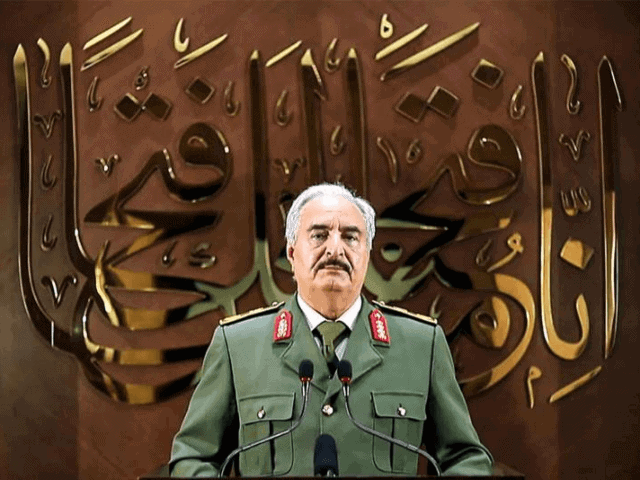Juan Guaidó: Libyan Warlord Khalifa Haftar’s Plane Landed in Venezuela

Venezuelan President Juan Guaidó, who has no power in the country in practice, claimed on Monday that an aircraft belonging to Libyan warlord Khalifa Haftar had arrived in Venezuela a day before.
While Guaidó’s communications team had previously claimed Haftar himself was in the South American country, Guaidó’s statement said that only his plane had arrived. Guaidó offered no further details, baffling geopolitical experts.
While constitutionally the president of Venezuela, Guaidó has no enforcement power because the nation’s military answers to socialist dictator Nicolás Maduro. Guaidó made the announcement on Haftar in remarks more broadly accusing Maduro of ties to Middle Eastern terrorism, highlighting in particular Maduro’s ties to the Islamic regime in Iran. Supreme Leader Ayatollah Ali Khamenei is one of Maduro’s most vocal and consistent allies.
Haftar, a close military confidant of late dictator Muammar Qaddafi, has struggled to wrestle control of the country how of the hands of the U.N.-recognized Government of National Accord (GNA) since rebels killed Qaddafi after storming his palace in 2011. Last year, Haftar’s army invaded Tripoli, the nation’s capital, prompting a battle that is only slowly winding down last week.
Reports suggest that the GNA defeated Haftar’s army on Thursday, prompting a slow withdrawal of forces. The struggle between the GNA and Haftar had become a proxy war between his allies, Russia and Egypt, and the government of Turkey, which began sending supplementary forces to help the GNA in January. Turkey entering the fray appeared to be the turning point that sealed Haftar’s demise.
Now, Guaidó claims that Haftar, or at least Haftar’s plane, has left Africa.
“From Venezuela, there have been attempts to generate destabilization in some countries of the region. I raise these flags of alert because it has to do with each of the nations of the region,” Guaidó said on Sunday, according to a statement from his embassy in the United States, which added, “on Sunday, June 7th, [Guaidó warned] that the airplane of the head of the self-proclaimed Libyan National Army, Khalifa Haftar, had arrived in Venezuela.”
Guaidó did not say if he believed that Haftar himself was on the plane, nor did he specify any other potential passengers. He did not elaborate on why Haftar would choose to vacate to Venezuela if he was, indeed, defeated. Guaidó made the remark while warning generally of Maduro’s known ties to terrorist organizations like the Revolutionary Armed Forces of Colombia (FARC) and Hezbollah.
While Iran, Hezbollah’s patron, has not explicitly supported Haftar, it is allied with Russia, Haftar’s most prolific supporting regime. Reports indicate that veterans of the Syrian Civil War have also traveled to Libya to aid Haftar; Russia intervened in Syria on behalf of Iran’s ally, dictator Bashar al-Assad.
In May, Israeli Ambassador to the United Nations Danny Danon asserted that evidence existed of Iranian weaponry landing in Haftar’s hands in late 2019.
“The presence of this advanced Iranian-manufactured system on Libyan soil is another grave violation of Security Council resolution 2231 (2015), as set forth in article 6 (b) of annex B, which prevents ‘the supply, sale, or transfer of arms or related materiel from Iran,’” Danon said.
No public clarity exists on the nature of the relationship between Hafter and Maduro. Last week, the Wall Street Journal suggested, citing anonymous sources, that Haftar had visited Caracas seeking to make a deal with the socialist regime on selling and refining oil to better fuel Russia’s importing of mercenaries to come to his aid. The report did not specify when the Caracas visit took place if it did. Both Maduro and Haftar have access to some of the world’s largest oil reserves but lack the infrastructure and competent staff to extract it. Maduro is facing strict sanctions against purchasing Venezuelan oil from his regime and not Guaidó’s government, as well. Neither side has confirmed the veracity of the report.
Reports began surfacing of a potential retreat on Khalifa’s part in Tripoli in late May, when observers noted what appeared to be the withdrawal of hundreds of Russian and Syrian fighters from the area. By Thursday, Mohamad Gnounou, a GNA spokesman, had declared victory.
“In these historic moments, we announce that all municipal boundaries of Tripoli have been liberated,” he asserted.
Islamist Turkish President Recep Tayyip Erdogan affirmed the victory on Monday, claiming that President Donald Trump supports Turkey’s backing of the GNA.
“The victories achieved by the Libyan legitimate forces had made Haftar go mad,” Erdogan said on Turkey’s TRT network. “Trump is following closely the unfolding situation in Libya and had praised Turkey’s efforts in Libya.”
The claim that Trump “praised” Erdogan’s intervention in Libya contradicts Trump’s insistence in 2017 that he believed there was “no role” for the United States in the struggle between the GNA and Haftar’s forces. Last year, in the aftermath of Haftar initially attacking Tripoli, Trump reportedly reached out to the warlord and had a conversation with him in which, according to the White House, he “recognized Field Marshal Haftar’s significant role in fighting terrorism.”
Haftar has repeatedly claimed that Sunni jihadist groups are aiding the GNA. The Islamic State has taken credit for attacks on Haftar’s forces.
Photo: LNA War Information Division/AFP -




